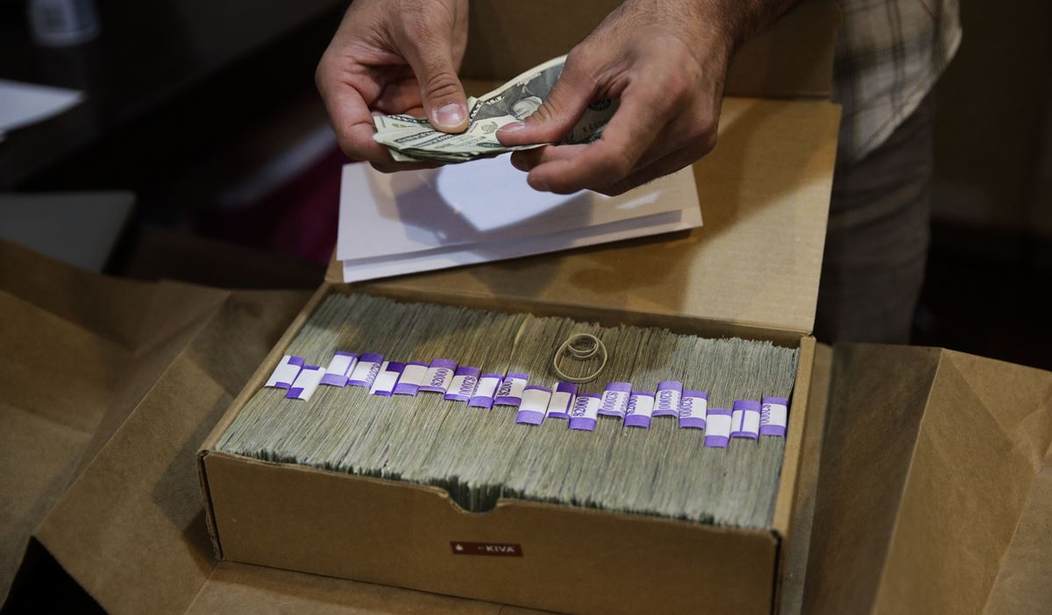Welfare is damaging to those who are roped into it. While I'm sure I don't need to tell you that as the results of communities soaked in welfare are demonstrably worse off than those who aren't, a recent study shows the latest popular welfare trend, Universal Basic Income (UBI) is just as bad an idea as any other welfare state idea out there.
You can probably remember UBI was being pushed by Democrat presidential candidates like Andrew Yang and sent many low-info voters clamoring for their unearned $1,000 a month check.
It was enough for one group to begin experimenting with UBI to see if it really does help Americans, as Yang and people who agreed with him claimed.
According to Reason, a published paper found that researchers tracked a number of people in Illinois and Texas over the course of three years who were given $1,000 a month from nonprofit groups that funded the study. The average household income for these homes was around $29,000 in 2019, resulting in a 40 percent increase in their income. What they found was that those who received this money didn't put forth as much effort to be financially independent:
Participants receiving the $1,000 monthly payments saw their income fall by about $1,500 per year (excluding the UBI payments), due to a two percentage point decrease in labor market participation and the fact that participants worked about 1.3 hours less per week than the members of the control group.
"You can think of total household income, excluding the transfers, as falling by more than 20 cents for every $1 received," wrote Eva Vivalt, a University of Toronto economist who co-authored the study, in a post on X. "This is a pretty substantial effect."
What did they do with the time they had with that free money? Nothing, really. They mostly coasted:
Participants in the study generally did not use the extra time to seek new or better jobs—even though younger participants were slightly more likely to pursue additional education. There was no clear indication that the participants in the study were more likely to take the risk of starting a new business, although Vivalt points out that there was a significant uptick in "precursors" to entrepreneurialism. Instead, the largest increases were in categories that the researchers termed social and solo leisure activities.
This wouldn't be that big of a deal if money for UBI programs grew on trees, but that money has to come from somewhere and in a national setting that would be the government. Since the government runs on taxpayer dollars generated by working people being taxed on everything they do, fewer people working and doing things would send the economy spiraling and ending in a massive crash.
No one should be surprised by this at all, however.
Welfare systems of any kind are usually a brick wall you send your economy smashing into because you know it won't smash into it for years after you've been in office, but boy howdy does it help you buy votes at the moment of the election.
But one thing that's been proven, and has been proved again and again, is that giving a man a fish feeds him for a day, but it doesn't teach him to fish so he can feed himself. If you're trying to keep that man from starving to death, you have to keep giving him fish daily, and if you keep doing that, he'll think he's entitled to the fish. The mere threat of taking the daily fish away causes panic and indignation.
You could really use that panic and indignation as a tool to get people to vote for you with promises to both protect and increase the amount of fish you get.
Many black communities were roped into welfare systems back in the 1960s by President Lyndon B. Johnson and decades later, it was evident that this hadn't helped anyone. In fact, it was keeping many black people in poverty thanks to the fact that once you were on it, it was hard to get out of it, and the government had made it hard to climb out of the welfare hole:
In simple terms, a poor family trying to escape poverty pays an effective marginal tax rate that is considerably higher than a middle class family and higher than or roughly equal to the marginal tax rate of a family in the top one percent. Given that our federal income tax system is supposed to progressive, meaning higher income families pay a higher percentage of that income in taxes, it is nonsensical to impose such high tax rates on families in poverty.
Clearly, welfare benefits must phase out as incomes rise, but they do not have to phase out this rapidly. An effective marginal tax rate that high can (and by numerous accounts from the real world does) cause families in and near poverty to turn down opportunities for promotions, raises, or more hours of work because the higher earned income is hardly worth it given the losses they face from taxes and lost benefits.
Thus, the way that welfare benefits phase out can serve to trap people in poverty. To obtain a job that provides a middle class living you typically work your way up through several entry-level and intermediate jobs with increasing incomes. Yet, if a person never accepts one of those intermediate jobs, because it pays more than the poverty line but less than the combination of a lower income plus welfare benefits, they will likely never get a job high-paying enough to be self-supporting.
(READ: Black Communities Are Disproportionately Affected Negatively by Democrats)
Welfare is great for politicians, but really bad for everyone else.















